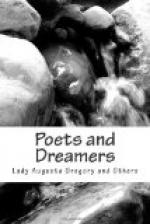’I was for a while
airy and beautiful, and all my treasure with my
pleasant James....
On the top of all, my Stuart to leave me. Och,
my grief, my friend
stole away from me!
’It is the truth I cannot sleep in the night, fretting for my comrade; I to be lying down, and he weak under cold. My heart leaps up with my bright Stuart. Och, my grief, my friend stole away from me!
’It is hard for me to lie down after that; it is an empty thing to be crying the loss of my comrade, and I lying down with the mean people; it is my death the Stuart not to come at all. Och, my grief, my friend stole away from me!’
I had not heard any songs of this sort in Galway, and I remembered that our Connaught Raftery, whose poems are still teaching history, dealt very shortly with the Royal Stuarts. ‘James,’ he says, ’was the worst man for habits.... He laid chains on our bogs and mountains.... The father wasn’t worse than the son Charles, that left sharp scourges on Ireland. When God and the people thought it time the story to be done, he lost his head.... The next James—sharp blame to him—gave his daughter to William as woman and wife; made the Irish English, and the English Irish, like wheat and oats in the month of harvest. And it was at Aughrim on a Monday many a son of Ireland found sorrow, without speaking of all that died.’
So I went to ask some of the wise old neighbours, who sit in wide chimney-nooks by turf fires, and to whom I go to look for knowledge of many things, if they knew of any songs in praise of the Stuarts. But they were scornful. ‘The Stuarts?’ one said; ’no, indeed; they have no songs about them here in the West, whatever they may have in the South. Why would they, running away and leaving the country? And what good did they ever do it?’ And another, who lives on the Clare border, said: ’I used to hear them singing “The White Cockade” through the country. “King James was beaten, and all his well-wishers; my grief, my boy that went with them!” But I don’t think the people had ever much opinion of the Stuarts; but in those days they were all prone to versify. But the famine did away with all that.’ And then he also was scornful, and said: ’Sure King James ran all the way from the Boyne to Dublin, after the battle. There was a lady walking in the street at Dublin when he got there; and he told her the battle was lost; and she said: “Faith you made good haste; you made no delay on the road.” So he said no more after that.’
And then he told me of the Battle of Aughrim, that is still such a terrible memory; and how the ’Danes’—the De Danaan—the mysterious divine race that were conquered by the Gael, and who still hold an invisible kingdom—’were dancing in the raths around Aughrim the night after the battle. Their ancestors were driven out of Ireland before; and they were glad when they saw those that had put them out put out themselves, and every one of them skivered.’




